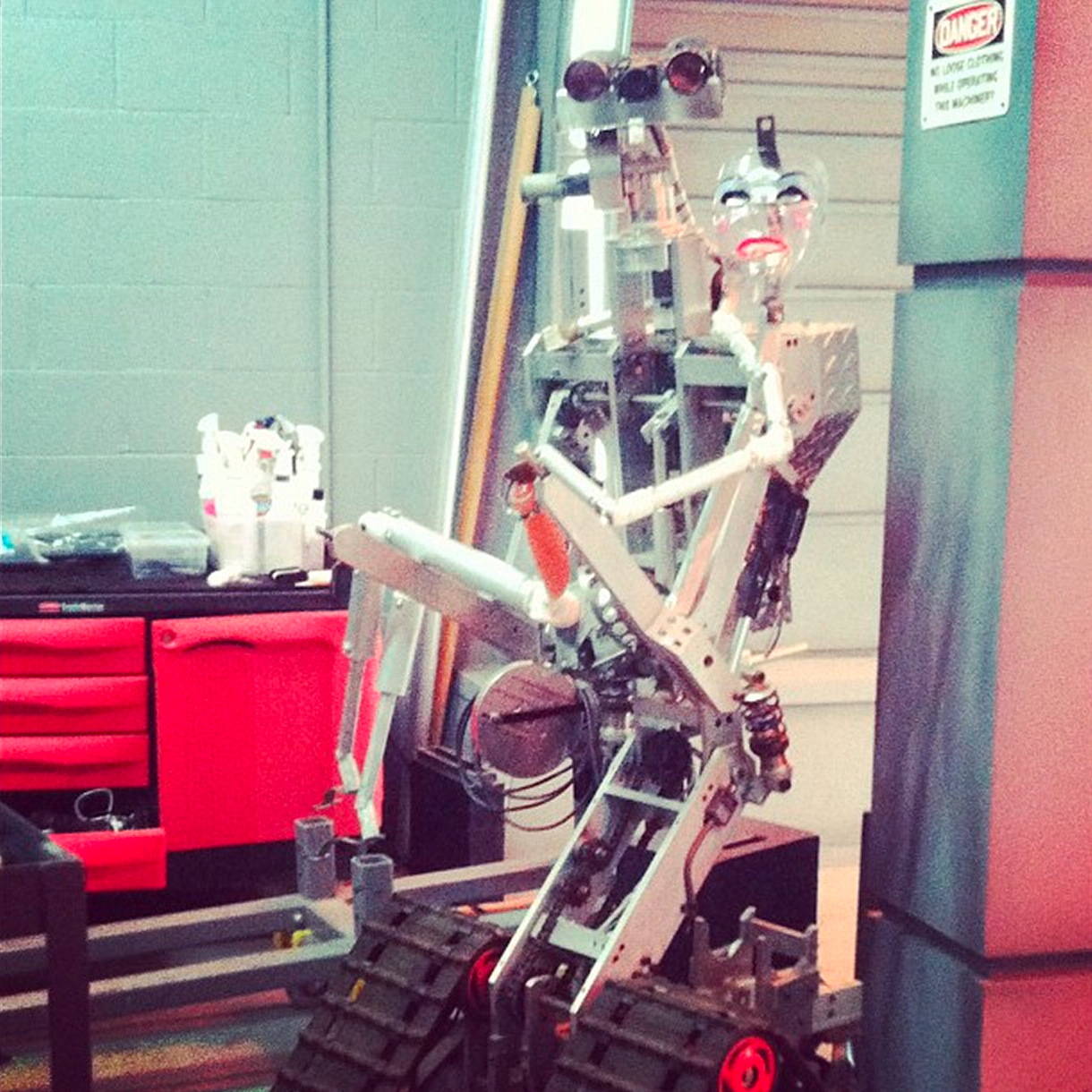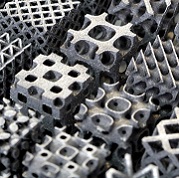|
Another thing to consider is that the mechanism by which automation has "created" jobs in the past isn't nearly as concrete as people would like to believe. Agricultural automation didn't lead to farmers suddenly all taking up jobs designing, building, and maintaining farming equipment. What it did do is create a large idle labor force and migration into urban areas, which (alongside other technical innovations) drastically altered the character of the workforce. Economic growth combined with an actual need for labor is what created jobs over the last century, not automation.
|
|
|
|

|
| # ? Apr 18, 2024 12:28 |
|
turn it up TURN ME ON posted:I think you're missing what the other people are saying. They're software engineers or automation engineers, and they're saying that more jobs like theirs will be created. They're saying that when a menial job is created it will be replaced by a job maintaining whatever thing replaced them. Automation would be pointless if it meant replacing twenty minimum-wage burger flippers with five well-paid autonation engineers and fifteen decently-paid robot fixers. The whole point of automation is to reduce the number of employees necessary to do the same amount of work. Your friends would likely respond that rather than doing the same amount of work, the business would use the cost and efficiency savings to expand their operations, doing so much more work that they end up with the same amount of employees as before (doing other work that expanded along with the main business) because they're so much more profitable. To that, though, the answer is simple: where's the demand? That answer works okay for manufacturing, where demand is pretty elastic, buying more than you need is no big deal, and oversupply just drives down prices and makes the company have to pay for warehouse space. Not so much in food service - the demand for food isn't nearly as elastic, so the room for market growth and capacity increases is somewhat more limited. And a lot of non-capacity investments, like building improvements and marketing, are also things that can be largely automated. The core assumption of automation as a public good is that the productivity improvements will lead to economic expansion that gets invested back into non-automatable labor. As more and more work gets automated, and the labor market and economy both get sicker and sicker, that critical principle gets less and less true.
|
|
|
|
boner confessor posted:this is very likely to be the case I think you overestimate rich people's egotism. Many of them, like us, are worried about the end of the world or massive societal upheaval and have the resources to prepare for it. Google "rich survivalist" (sorry, phone posting) and you'll see gated communities made for the rich to live out the apocalypse in luxury. Sure, if society collapses their lives will take a massive hit in quality but I think plenty will sacrifice their purchasing power for the sake of their survival. Besides, how many poor people does one need to lord over? You don't need billions, a few lackeys, a fool, maybe some slaves or a harem will do. Everything else would just be a faceless mass of usless eaters.
|
|
|
|
There thing about automating white collar work definitely strikes true for the company I work for. We've expanded from 150 to 260 employees over the last couple years, and maybe five of those hires aren't production crew or supervisors. Many of the "white collar" office staff wear multiple hats, I'm nominally a QA inspector but I also do IT, purchasing, quoting, job planning, etc. Modern software automates much of the individual tasks required to fulfill those roles, which is good if you're a young guy who is good with computers but pretty bad for everyone else. The funny part is we do a lot of cnc machining (about to fill another 60k sqft with machines) but basically none of it is automated. Nothing is palletized with automatic loaders that would move a job from position to position. Most of the machine operators operate one machine at a time. Apparently it's cheaper to hire a guy or a gal for $10/hr to load blocks and push the start button and have a real machinist for every 20 or so operators to solve problems with the mills and hope your inspection department catches the poo poo parts.
|
|
|
|
One thing that a lot of people get backwards is thinking of automation as 'We bought this robot. You're fired'. That's not really how it shows up. The effects of automation take years to decades to show up and are seen in the soul crushing experience of 'I've sent out a hundred and ten applications this week and had seventeen Skype interviews and I'm still unemployed because everyone wants 4-6 years of experience in this precise job for an entry level position'.
|
|
|
|
The single biggest argument against the automation scare mongering is that autopilot systems fully capable of taking off, flying, and landing a plane without any human intervention were invented decades ago and yet today we have a shortage of airplane pilots. Until someone can explain to me why this happened and why it won't happen in other jobs (especially in the favorite topic of truck drivers and self-driving trucks), I'm going to take all of these claims with a large bucket of salt. The fact that these claims often cite things that are just plain wrong as evidence doesn't help matters. For example: Tasmantor posted:There would have been a time when people thought checkout work couldn't be automated so it was safe. Now one staff member runs ten auto checkouts and no one bats an eye. Actually, self-checkout lines are falling out of use because they lead to rampant shop lifting. Yeah, Amazon claims to have found some kind of solution to this involving "computer vision." I'll believe it when I see it. Tasmantor posted:ATMs layed off thousands of bank clerks. Actually, the number of bank clerk jobs steadily increased at the same time that ATMs were adopted. INH5 fucked around with this message at 04:00 on Dec 6, 2016 |
|
|
|
rscott posted:Apparently it's cheaper to hire a guy or a gal for $10/hr to load blocks and push the start button and have a real machinist for every 20 or so operators to solve problems with the mills and hope your inspection department catches the poo poo parts. And there is the real question. Just asking "Can it be automated?" is a waste of time. "Is it cheaper or does it produce more when it is automated?" That's what matters.
|
|
|
|
INH5 posted:Yeah, Amazon claims to have found some kind of solution to this involving "computer vision." I'll believe it when I see it.
|
|
|
|
rscott posted:The funny part is we do a lot of cnc machining (about to fill another 60k sqft with machines) but basically none of it is automated. um...cnc...is...automation? that's the whole point, more productivity with fewer workers
|
|
|
|
INH5 posted:Actually, self-checkout lines are falling out of use because they lead to rampant shop lifting. Actually, they aren't falling out of use
|
|
|
|
Feral Integral posted:Actually, they aren't falling out of use Actually, they are.
|
|
|
|
SaTaMaS posted:um...cnc...is...automation? You can have three or four guys running 3 axis machines each with a different position or setup, or you can have one guy running all four machines with robots moving the parts from machine to machine (or you can spend a million bucks on a 5 axis machine and do it in one setup)
|
|
|
|
rscott posted:You can have three or four guys running 3 axis machines each with a different position or setup, or you can have one guy running all four machines with robots moving the parts from machine to machine (or you can spend a million bucks on a 5 axis machine and do it in one setup) Yeah but there are still shops running manual machines and blaming China for stealing all their jerbs instead of investing in CNC machines and learning how to use them.
|
|
|
|
INH5 posted:The single biggest argument against the automation scare mongering is that autopilot systems fully capable of taking off, flying, and landing a plane without any human intervention were invented decades ago and yet today we have a shortage of airplane pilots. Until someone can explain to me why this happened and why it won't happen in other jobs (especially in the favorite topic of truck drivers and self-driving trucks), I'm going to take all of these claims with a large bucket of salt. Air travel (and to the same extent airframe manufacturing) is all about trust and risk reduction. Sure they have these systems. But just like self-driving cars, there will be someone behind the wheel. That is, until people become comfortable with the automated systems and the perceived risk of using them becomes negligible. At first, they'll start by retraining the pilots to allow the planes to take the wheel for certain phases of flight, just like they do now, but with more emphasis on taxi, takeoff, and landing. Then pilots will become glorified babysitters for the fully automated planes. After 20-30 years of advertising this to their customers (because everything in aviation is slow, they still don't have wireless DAL C systems yet, much less B or A), airlines may start introducing fully automated flights to see how the passengers take it. If people accept it, great. If not, then they just put in some guy with 10 hours of flight training and pay him 15 bucks an hour. Either way, the well trained, well paid pilots are doomed long term.
|
|
|
|
Shao821 posted:Air travel (and to the same extent airframe manufacturing) is all about trust and risk reduction. Sure they have these systems. But just like self-driving cars, there will be someone behind the wheel. That is, until people become comfortable with the automated systems and the perceived risk of using them becomes negligible. At first, they'll start by retraining the pilots to allow the planes to take the wheel for certain phases of flight, just like they do now, but with more emphasis on taxi, takeoff, and landing. Then pilots will become glorified babysitters for the fully automated planes. After 20-30 years of advertising this to their customers (because everything in aviation is slow, they still don't have wireless DAL C systems yet, much less B or A), airlines may start introducing fully automated flights to see how the passengers take it. If people accept it, great. If not, then they just put in some guy with 10 hours of flight training and pay him 15 bucks an hour. Either way, the well trained, well paid pilots are doomed long term. I'm sure that the fuel and maintenance costs of a jumbo jet dwarf the pilot's labor cost. I would be shocked if the airlines would be that motivated to do away with trained human pilots.
|
|
|
|
silence_kit posted:I'm sure that the fuel and maintenance costs of a jumbo jet dwarf the pilot's labor cost. I would be shocked if the airlines would be that motivated to do away with trained human pilots. Only if the autopilot is more efficient than the human pilot in terms of maintenance and fuel cost. If autopilot can perform smoother landings at optimal speeds, it would pay to keep the human from touching things unless it's an emergency.
|
|
|
|
Dr. Arbitrary posted:Only if the autopilot is more efficient than the human pilot in terms of maintenance and fuel cost. I'm saying that I suspect that the labor cost of pilots isn't that high relative to all of the other costs of flying for the airlines to put a lot of effort into totally removing trained human pilots from the loop. There's not a lot of motivation to do it. Pilots already do a good job landing planes--I'd be shocked if the aircraft industry puts a lot of thought into further improving the smoothness of aircraft landings. They are already pretty smooth. silence_kit fucked around with this message at 05:39 on Dec 6, 2016 |
|
|
|
silence_kit posted:I'm sure that the fuel and maintenance costs of a jumbo jet dwarf the pilot's labor cost. I would be shocked if the airlines would be that motivated to do away with trained human pilots. Airline salaries make up 20% of the cost of an average airline ticket. Granted, I have no idea what portion of that is the pilots' salaries compared to everyone else. Shao821 posted:Air travel (and to the same extent airframe manufacturing) is all about trust and risk reduction. Sure they have these systems. But just like self-driving cars, there will be someone behind the wheel. That is, until people become comfortable with the automated systems and the perceived risk of using them becomes negligible. At first, they'll start by retraining the pilots to allow the planes to take the wheel for certain phases of flight, just like they do now, but with more emphasis on taxi, takeoff, and landing. Then pilots will become glorified babysitters for the fully automated planes. After 20-30 years of advertising this to their customers (because everything in aviation is slow, they still don't have wireless DAL C systems yet, much less B or A), airlines may start introducing fully automated flights to see how the passengers take it. If people accept it, great. If not, then they just put in some guy with 10 hours of flight training and pay him 15 bucks an hour. Either way, the well trained, well paid pilots are doomed long term. Okay. This all makes perfect sense. But it's very different from the typical automation apocalypse scenario. In fact, it seems like one of the end points (the one where pilots get 10 hours of flight training and are paid 15 bucks an hour) could easily result in more people being employed as airline pilots, albeit for much lower wages, because the lower costs would presumably lead to lower flight prices and thus to more plane trips, more planes, and more pilots to babysit those planes. If people were talking about this kind of scenario happening elsewhere due to automation, I'd be a lot more receptive. Like, if people were to say that self-driving trucks will lead to lower wages for truckers, because once the job duties are reduced to "babysit the fully automated trucks, fight off hijackers if necessary, and maybe fill out some paperwork," the job can be done by high school dropouts for a lot less money, then I would agree that that scenario does sound very likely and like it might cause a number of problems. But instead everyone talks about how there's going to be chaos! Because there are more than 3 million truck drivers in America and every single one of them is going to be put out of work by robotrucks! And there are way too many historical counterexamples for me to take that kind of talk seriously. And to anyone who says, "but trucks are different because they usually don't carry passengers," I raise the question of why cargo planes also still have pilots. INH5 fucked around with this message at 05:45 on Dec 6, 2016 |
|
|
|
JVNO posted:Art is not a viable employment solution because it requires popularity to be economically beneficial. It relies on the fact there's only 1 mega popular celebrity making music/movies/etc. for every million regular schlubs who consume it. There will be no art based economy to replace our current paradigm of work. Recent years have seen an enormous rise in the number of celebrities and a large drop in the average ratio of consumers:celebrity. You might know these new celebrities by terms like "Youtube reviewer" and "Twitch streamer." Now, I do have my doubts as to how much this can really be scaled up, but "1 mega popular celebrity making music/movies/etc. for every million regular schlubs who consume it" is hilariously out of date. INH5 fucked around with this message at 06:04 on Dec 6, 2016 |
|
|
|
A few stores doesn't mean that they're falling out of favor. Every bit of data I can find on the global self-checkout market (which is unfortunately not all that much) shows it growing rapidly. I'm sure some stores are abandoning them for one reason or another, but people have been arguing that self-checkouts are going way since they first started becoming somewhat common over a decade ago. They aren't going anywhere, at least until systems like Amazon's or less complex versions like Sam's Club's Scan & Go replace them.  And yes, I realize that's four year old data. The point is that stories about retailers abandoning self-checkout were common back then too, but the market seems to be growing in spite of that. INH5 posted:Recent years have seen an enormous rise in the number of celebrities and a large drop in the average ratio of consumers:celebrity. You might know these new celebrities by terms like "Youtube reviewer" and "Twitch streamer." Unfortunately, the only people who make money at this are the top shelf celebrities. There are tons of content creators who are just barely getting by and probably working second jobs. Here's a random article about one, but you can find plenty more. This isn't a financially viable career option for most people who want to do it.
|
|
|
|
I think Owlofcreamcheese made a very good point here:Owlofcreamcheese posted:Like this whole thing feels like a bad sci-fi story where something changes all of society in one aspect but then everything just stays the same in every other aspect for some reason? For example, let's say that, contrary to my doubts posted above, we really do get robocars and robotrucks good enough to put every trucker, taxi driver, and so on out of work. Sucks for the truckers, taxi drivers, and so on. But what about everyone else? One plausible consequence is that if you don't need to drive the car yourself, you can spend the morning and evening commute playing Angry Birds on your smartphone. Which means that long commutes become a lot more bearable. Which means that the "maximum reasonable distance between home and work" is going to go up for a lot of people. Which not only increases their range of available jobs, but could also decrease their cost of housing since living in a cheap place out in the boonies would be a lot more viable. Even for people who don't own cars, a ticket for a driverless bus would presumably cost significantly less than a ticket for an old fashioned bus with a driver. And this isn't even taking into account the possibility that robocars could lead to less traffic jams, which would make everyone's commute easier... Not that that's guaranteed to happen, but it's at least as plausible as half of the scenarios I've seen about robocars taking all of our jarbs. Paradoxish posted:A few stores doesn't mean that they're falling out of favor. Every bit of data I can find on the global self-checkout market (which is unfortunately not all that much) shows it growing rapidly. I'm sure some stores are abandoning them for one reason or another, but people have been arguing that self-checkouts are going way since they first started becoming somewhat common over a decade ago. They aren't going anywhere, at least until systems like Amazon's or less complex versions like Sam's Club's Scan & Go replace them. Okay, I'll concede the point for now. I'll need to do more research on this before I make a final judgment. Paradoxish posted:Unfortunately, the only people who make money at this are the top shelf celebrities. There are tons of content creators who are just barely getting by and probably working second jobs. Here's a random article about one, but you can find plenty more. This isn't a financially viable career option for most people who want to do it. There's still a heck of a lot more people making money as celebrities than there were 10 years ago. And I don't think you can dismiss people who have to work a second job to make ends meet. 10 years ago, their current second job would probably be their only job, so they're still better off than they would be without the option of internet celebrity. And it isn't like artists working second jobs is anything new either. Even Shakespeare, or at least his family, had a side business selling malt.
|
|
|
|
Hold up though are we going to get a sweet neo- grapes of wrath only this time about burger flippers being forced off their flat tops by the banks newfangled machines? I kinda want to read some really deep metaphors bout how a man can't know the beef lest he work it with his hands.
|
|
|
|
I would just like to point out that Johnny 5 is a sex worker now because his position has been occupied by more human like robots so he can only make money in dehumanization. He works at the Armory, a bondage studio out of San Francisco.
|
|
|
|
INH5 posted:The single biggest argument against the automation scare mongering is that autopilot systems fully capable of taking off, flying, and landing a plane without any human intervention were invented decades ago and yet today we have a shortage of airplane pilots. Until someone can explain to me why this happened and why it won't happen in other jobs (especially in the favorite topic of truck drivers and self-driving trucks), I'm going to take all of these claims with a large bucket of salt. The cost of a seat in a airship is dynamic. Based on the number of available seats, the date of the flight, the date of the year, and even current events (like revolts in $destination) and demand. You can have a group of dudes updating manually the price of each seat for each flight. But thats unmantainable, you will have empty seat because you failed to make a seat cheaper when that would have result on filling it. Or you can have a seat sell a much cheaper price people would have paid for it. So you create a automatic tool that allow 2 person to update the prices of seats for the whole company, by setting price ranges and dates. Is still a lot of job, and is unflexible, from day 1 to day 12 of december this seat is 40$ and from day 12 to day 25 is 70$ and from day 25 to day 29 is 20$. So now you create a dynamic algorithm that instead of stages from prices, create a smooth curve for the price of the seats. This curve is dynamic and demand, current events, price of oil, etc.. update the price dynamically. This result in less empty seats and asking more money for seats when people is willing to pay for them. So this company make more money from each seat. Since now this system is automated, you don't need 2 people. 1 single dude with other tasks (so this is not his main task) can check it if how is working. Where there use to be 8 people full time updating prices, now theres 1/5 of one. And the company is much more profitable, because less empty seats, and more aggressive prices. Tei fucked around with this message at 10:19 on Dec 6, 2016 |
|
|
|
INH5 posted:Actually, the number of bank clerk jobs steadily increased at the same time that ATMs were adopted. US only article and the increase in tellers is due to the increase in branches. Australia didn't experience an expansion of branches. Banks globally are shutting branches due to the rise of internet commerce so lay offs are even forecast in that article. So no ATMs mean less clerks per branch and now that the internet is automating shopping more there's less need for branches. feel like the other poster covered the self checkout thing.
|
|
|
|
INH5 posted:Yeah, Amazon claims to have found some kind of solution to this involving "computer vision." I'll believe it when I see it.
|
|
|
|
Are there any political parties anywhere in the world that are at least semi-coherently trying to address this issue? This could be the big break the Left needs after failing globally with the liberal capitalism + identity politics combo. All I've heard are some unsuccessful attempts to introduce universal income, I think in Switzerland and Netherlands. It's the first step I guess but I don't know how that can work without serious changes in the tax system or some other way to redistribute wealth. As people become unemployed the state will collect less taxes and at the same time will have to increase spending to pay them universal income.
|
|
|
|
Doctor Malaver posted:Are there any political parties anywhere in the world that are at least semi-coherently trying to address this issue? This could be the big break the Left needs after failing globally with the liberal capitalism + identity politics combo. Currently the solution is just for people to either go back to school and update their skills, or for them to move to a place where their skills are more valuable. Neither seems extremely *cough* popular.
|
|
|
|
SaTaMaS posted:Yeah but there are still shops running manual machines and blaming China for stealing all their jerbs instead of investing in CNC machines and learning how to use them. There isn't anyone left in the United States doing aerospace machining that's using manual mills for their main production. You wouldn't be able to keep your tolerances in spec on anything complex and actually produce any volume of parts. We run one type of parts on manual mills and its because they're parts that haven't changed meaningfully since the 90s.
|
|
|
|
Cicero posted:In order to even get into the store you need a valid Amazon account that's recognized as you enter, then the cameras/sensors are tracking you everywhere you go. Seems like that would cut down on shoplifting quite a bit. Ok, so what do all the people who don't have amazon accounts do?
|
|
|
|
Presumably they don't shop there, same as Costco/Sam's Club.
|
|
|
|
rscott posted:There isn't anyone left in the United States doing aerospace machining that's using manual mills for their main production. You wouldn't be able to keep your tolerances in spec on anything complex and actually produce any volume of parts. We run one type of parts on manual mills and its because they're parts that haven't changed meaningfully since the 90s. I'm not talking about the big manufacturers, I'm talking about the hundreds of thousands of guys doing contract work out of their garages and small businesses. I'm not sure exactly how many of them are still using manual machines, but if everyone was using the sorts of CNC techniques you were describing companies in the US wouldn't be so desperate for manufacturing talent.
|
|
|
|
Death Bot posted:You think I post on this forum from home? I'm fulfilling my patriotic duty as we speak. 100% of my work is remote (remote IT work for clients) but I'm not allowed to do it from home ever They give me a laptop but I can't VPN from home and work with it, so there's no point taking it out of the office, if there's another Chicago blizzard I'm still expected to make the commute and be in at 7 am sharp I hate American business culture so much override367 fucked around with this message at 14:38 on Dec 6, 2016 |
|
|
|
Shao821 posted:Air travel (and to the same extent airframe manufacturing) is all about trust and risk reduction. Sure they have these systems. But just like self-driving cars, there will be someone behind the wheel. That is, until people become comfortable with the automated systems and the perceived risk of using them becomes negligible. At first, they'll start by retraining the pilots to allow the planes to take the wheel for certain phases of flight, just like they do now, but with more emphasis on taxi, takeoff, and landing. Then pilots will become glorified babysitters for the fully automated planes. After 20-30 years of advertising this to their customers (because everything in aviation is slow, they still don't have wireless DAL C systems yet, much less B or A), airlines may start introducing fully automated flights to see how the passengers take it. If people accept it, great. If not, then they just put in some guy with 10 hours of flight training and pay him 15 bucks an hour. Either way, the well trained, well paid pilots are doomed long term. 15 bucks p/h and 10 hour sof flight training doesn't cover the 1% of situations where a human pilot is needed over an automated pilot. Automated flying uses huge amounts of data from successful human flights to behave in the optimal fashion in a variety of conditions, including particularly challenging ones. The problem is is that the flights where things go wrong are, necessarily, statistical outliers with uniquely challenging conditions. This type of story comes to mind: http://www.nydailynews.com/new-york/commercial-airplane-crashes-hudson-river-article-1.361188 Until we invent functionally true AI, one that is able to think in a lateral fashion and not within a set of predetermined parameters (which could restrict it in unforeseen circumstances), this is something only a human is really capable of. There is an actually an ongoing debate within the profession of flying about the approaches of the two main commercial airline manufacturers. Airbus takes the approach that the flight control system has ultimate authority, and will limit of the input of the pilot by restricting their ability to control the plane within a certain envelope. Boeing on the other hand 'trusts' the pilots a lot more, allowing them to perform more extreme manoeuvres (which can be either good or bad depending on the skill of the pilot). Both sides have advantages and disadvantages, Boeing's trust in pilots has allowed them to arrest catastrophes and airbus's restrictions have arguably prevented them. Another thing to bear in mind is redundancy. Having two pilots is not necessary to fly the plane, one would do, but having two dramatically reduces the likelihood of both being incapacitated simultaneously (they even eat separate food to prevent food poisoning). Human pilots can also use analog interfaces and instruments to fly the plane if the digital and electrical ones fail. Basically, what I'm trying to say is is that human pilots and most of the safety measures on a modern aircraft are not required 99% of the time on a commercial aircraft, but they are there to give up to 600 people a much better shot at surviving if things do wrong in an unpredictable way. Flying will be automated one day (cargo before passenger), but we are long way off that capability right now.
|
|
|
|
Main Paineframe posted:Automation would be pointless if it meant replacing twenty minimum-wage burger flippers with five well-paid autonation engineers and fifteen decently-paid robot fixers. The whole point of automation is to reduce the number of employees necessary to do the same amount of work. The conundrum to me is that if automation replaces any significant portion of the work force without an alternative, the resulting economic collapse will gently caress all those companies that just bought robots because nobody's buying their poo poo anymore
|
|
|
|
Shows a picture of a drone: this thing can flight to iran capital and destroy a target the size of a car, then flight back. But so much is science fiction, for now.
|
|
|
|
I chuckle every time I see the words "reduce prices" in this thread, as though companies aren't gonna just pocket more profit and bonuses.
|
|
|
|
Nevvy Z posted:I chuckle every time I see the words "reduce prices" in this thread, as though companies aren't gonna just pocket more profit and bonuses.
|
|
|
|
Nevvy Z posted:I chuckle every time I see the words "reduce prices" in this thread, as though companies aren't gonna just pocket more profit and bonuses.
|
|
|
|

|
| # ? Apr 18, 2024 12:28 |
|
SaTaMaS posted:I'm not talking about the big manufacturers, I'm talking about the hundreds of thousands of guys doing contract work out of their garages and small businesses. I'm not sure exactly how many of them are still using manual machines, but if everyone was using the sorts of CNC techniques you were describing companies in the US wouldn't be so desperate for manufacturing talent. Who says the US is desperate for manufacturing talent in the first place? US companies may act like they're facing a skills shortage but that's largely because they don't want to pay wages. That's the other big thing about automation, the capital expenses can be pretty big up front but since they're capital you can write the depreciation off in a manner that is advantageous for your taxes.
|
|
|




























